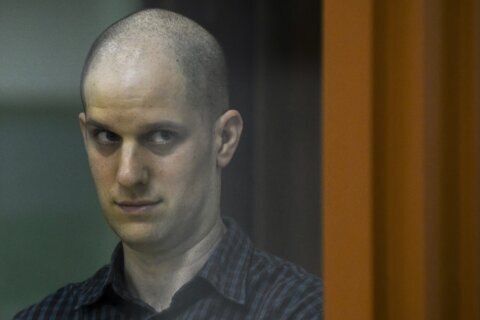ORLANDO, Fla. (AP) — Survivors and the families of victims of the Pulse nightclub massacre had hoped by now to have a permanent memorial in place for Wednesday’s eighth anniversary of the attack by a lone gunman who killed 49 people at the gay-friendly club in Orlando, Florida.
Instead, new, scaled-back plans are only now getting off the ground following a botched effort to build a multimillion-dollar memorial and museum by a private foundation that disbanded last year.
The city of Orlando purchased the nightclub property last year for $2 million, and it has since outlined more modest plans for a memorial. The original idea for a museum has been jettisoned and, last week, city leaders formed an advisory board to help determine what the memorial will look like.
“We’re very much hoping to find a number of family members to be a part of this committee, as well as survivors,” said Larry Schooler, a facilitator tasked with guiding the memorial effort. City officials said the goal is to have the memorial completed by 2028 at the site near downtown Orlando.
Until last year, efforts to build a memorial had been moving ahead in fits and starts ever since the massacre.
On June 12, 2016, Omar Mateen opened fire during a Latin night celebration, leaving 49 dead and 53 wounded. At the time, it was the worst mass shooting in modern U.S. history. But it was surpassed the following year when 58 people were killed and more than 850 were injured among a crowd of 22,000 at a country music festival in Las Vegas. Mateen, who had pledged allegiance to the Islamic State group, was killed after a three-hour standoff with police.
An annual run was held last weekend to remember the Pulse victims. On Wednesday, planned events to commemorate the anniversary included an annual bell ringing at a downtown church, a blood drive and a remembrance ceremony at a downtown performing arts venue.
“Now eight years since the Pulse tragedy, our community recognizes that each of the 49 victims were individuals, with their own lives and dreams,” Orlando Mayor Buddy Dyer tweeted Wednesday. “Orlando will never forget them and will continue to make sure we respond to what happened on June 12, 2016, with love and kindness.”
In neighboring Osceola County, located south of Orlando, county commissioners on Wednesday unveiled plans for the county’s own rainbow-colored sculpture dedicated to remembering the Pulse victims, many of whom lived in the community. The sculpture will be located in a public lakefront park.
“I was asked by several of the victims’ families to have a special place here in Osceola County that they can go and pay respects to their loved ones that were lost in the Pulse tragedy,” said Cheryl Grieb, chair of the Osceola County Commission.
Barbara and Rosario Poma and businessman Michael Panaggio had previously owned the Pulse property, and Barbara Poma was the executive director of the onePulse Foundation — the nonprofit that had been leading efforts to build a memorial and museum. Barbara Poma stepped down as executive director in 2022 and then left the organization entirely last year amid conflict-of-interest criticism over her stated desire to sell instead of donate the Pulse property.
The original project unveiled in 2019 by the onePulse Foundation originally called for a museum and permanent memorial costing $45 million. However, that estimated price tag eventually soared to $100 million.
The scope of the project ended up stretching far beyond the fundraising abilities of the nonprofit, according to an investigation by the Orlando Sentinel.
Deborah Bowie, who took the helm of the foundation in 2022, told the Sentinel that what she found when she arrived was a “house of cards waiting to crash down.”
“There’s a big disconnect between what the board thought was going on and what I saw boots on the ground when I got here,” Bowie said. “The budgets that I saw, I couldn’t find the financial justification for.”
Meanwhile, Pulse survivors and others have been waiting eight years for a permanent memorial.
“All of us are entitled to closure, and that’s never going to happen until this memorial is built,” Brett Rigas told the Sentinel.
Copyright © 2024 The Associated Press. All rights reserved. This material may not be published, broadcast, written or redistributed.







